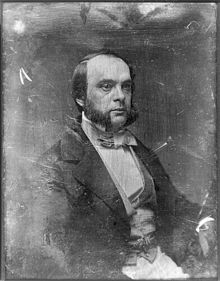August Belmont I
| August Belmont | |
|---|---|
 |
|
| Born |
December 8, 1813 Alzey, Hesse, Germany |
| Died | November 24, 1890 (aged 76) New York City, New York, U.S. |
| Resting place | Common Burying Ground and Island Cemetery; Newport, Rhode Island |
| Occupation | Financier, politician, foreign diplomat, racehorse owner/breeder |
| Net worth | US$10 million at the time of his death (approximately 1/1313th of then U.S. GNP) |
| Spouse(s) | Caroline Slidell Perry (m. 1849) |
| Children |
Perry Belmont August Belmont, Jr. Oliver Hazard Perry Belmont Raymond Rodgers Belmont Jennie Belmont (died age 10) Fredericka Belmont |
| Parent(s) | Isaac Simon Frederika Elsass |
August Belmont, Sr. (December 8, 1813 – November 24, 1890) was a German-American politician, financier, foreign diplomat, and party chairman of the Democratic National Committee during the 1860s, and later a horse-breeder and racehorse owner who established the Belmont Stakes. He is the namesake of the Belmont Stakes, third jewel of the Triple Crown series of American thoroughbred horse racing.
August Belmont was born with the name Isaac Belmont to a Jewish family in Alzey, in the Grand Duchy of Hesse, in Germany on December 8, 1813—some sources say 1826—to Simon and Frederika Elsass Belmont. After his mother's death, when he was age seven, he lived with his uncle and grandmother in the German financial capital of Frankfurt am Main ("Frankfurt on the Main River"). He attended The Philanthropin, a Jewish school, until he began his first job as an apprentice to the Rothschild banking firm in Frankfurt am Main. The young August would sweep floors, polish furniture and run errands while studying English, arithmetic, and writing. He was promoted to confidential clerk in 1832 and later traveled to Naples, Paris and Rome. At age 24, in 1837, Belmont set sail for the Spanish colony of Cuba and its capital city of Havana, charged with the Rothschilds' Cuban interests. On his way to Havana, Belmont stopped in New York City on a layover. He arrived in the previously prospering United States during the first waves of the financial/economic recession of the Panic of 1837, shortly after the end of the iconic two-term administration of President Andrew Jackson, the nation's first Democratic administration. Belmont remained in New York to supervise the jeopardized Rothschild financial interests in America, whose New York agent had filed for bankruptcy, instead of continuing on to Havana. In the financial/economic recession and Panic of 1837, hundreds of American businesses, including the Rothschild family's American agent in New York City, collapsed. As a result, Belmont postponed his departure for Havana indefinitely and began a new firm, August Belmont & Company, believing that he could supplant the recently bankrupt firm, the American Agency. August Belmont & Company was an instant success, and Belmont restored health to the Rothschilds' U.S. interests over the next five years. The company dealt with foreign exchange transactions, commercial and private loans, as well as corporate, railroad, and real estate transactions. Belmont owned a mansion in what is presently North Babylon, New York, on Long Island. It is now owned by New York State and is known as Belmont Lake State Park. In 1844, Belmont was named the Consul-General of the Austrian Empire at New York City, representing the Imperial Government's affairs in the major American financial and business capital. He resigned the consular post in 1850 in response to what he viewed as the Austrian government's policies towards Hungary, which had yet to gain equal status with Austria as part of the Dual Monarchy compromise of 1867. His interest in American domestic politics continued to grow.
...
Wikipedia
